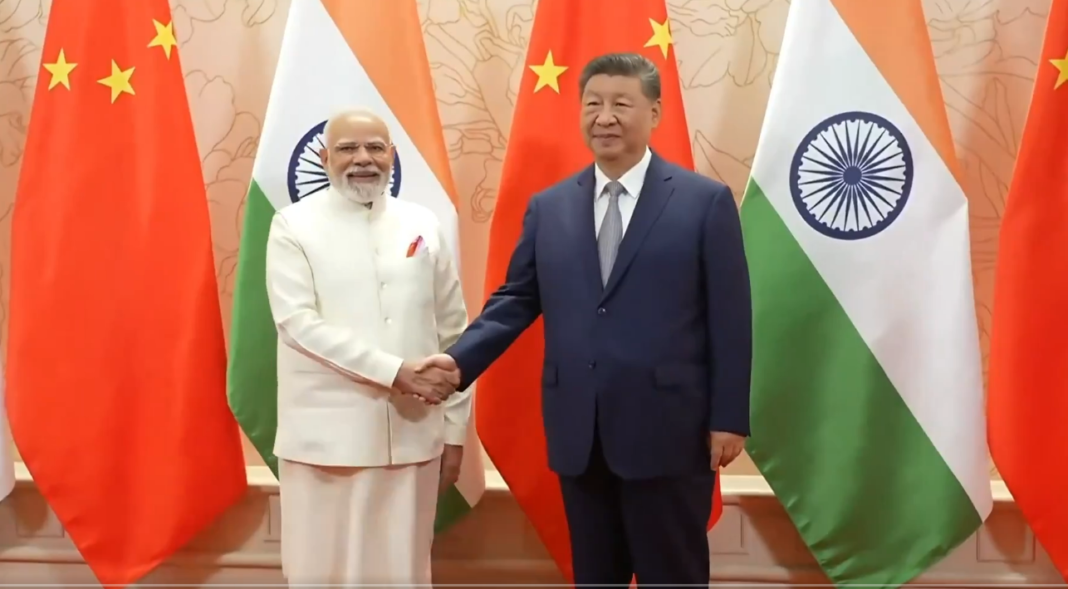Modi’s First China Visit in Seven Years
Prime Minister Narendra Modi arrived in Tianjin on Sunday for the Shanghai Cooperation Organisation (SCO) Summit 2025, marking his first visit to China in seven years. The trip carries strong symbolic and strategic significance as India and China attempt to reset their strained relationship following years of mistrust that stemmed from the 2020 border standoff in eastern Ladakh.
The SCO Summit, scheduled for August 31 to September 1, has brought together leaders from across Asia, including Russian President Vladimir Putin, Pakistan Prime Minister Shehbaz Sharif, Iranian President Masoud Pezeshkian, and Turkish President Recep Tayyip Erdoğan. Modi’s meeting with Chinese President Xi Jinping stood out as the most anticipated engagement of the day, given its potential to shape the future trajectory of Asia’s two largest nations.
English rendering of Prime Minister @narendramodi's remarks during bilateral meeting with Chinese President Xi Jinping in Tianjin
Read here: https://t.co/wf9x8gTLIv https://t.co/csXR3d1EQy
— PIB India (@PIB_India) August 31, 2025
Breakthrough on Border Peace and Connectivity
During their bilateral talks, Modi and Xi discussed the “successful disengagement” of troops in Ladakh last year, which helped stabilize border tensions. Both leaders underlined the importance of maintaining peace along the Line of Actual Control (LAC), stressing that the resolution of boundary issues must proceed from a broader political and long-term perspective.
The Prime Minister also confirmed that agreements had been reached on new border management mechanisms, the resumption of the Kailash Mansarovar Yatra, and the restarting of direct flights between India and China. These moves are being viewed as confidence-building measures aimed at strengthening people-to-people ties.
Xi’s Call for Cooperation, Not Rivalry
In his opening remarks, Chinese President Xi Jinping struck a conciliatory tone, describing India and China as “partners in cooperation, not rivals.” He emphasized that both nations, as the world’s two most populous countries, should view each other as development opportunities rather than threats.
Xi further highlighted the significance of the 75th anniversary of China-India diplomatic ties, calling it a chance to “handle the relationship from a strategic and long-term perspective.” He urged both nations to shoulder their “historic responsibility” of upholding multilateralism, building a multipolar world, and contributing to peace and prosperity in Asia.
Modi’s Commitment to Mutual Trust and Sensitivity
Prime Minister Modi responded by reiterating India’s commitment to move relations forward based on “mutual trust, respect, and sensitivity.” He stressed that the welfare of 2.8 billion people—roughly one-third of humanity—was linked to the success of India-China cooperation.
“We are determined to take our relationship forward. Our cooperation is not only important for the two countries but also crucial for the welfare of humanity,” Modi said during the meeting.
Broader Geopolitical Context
The Modi-Xi meeting comes at a time when India faces mounting pressure from the United States over its energy imports from Russia, while China is seeking to counterbalance its own trade friction with Washington. Against this backdrop, Beijing and New Delhi see value in recalibrating their bilateral relationship to safeguard their economic and geopolitical interests.
The SCO platform has also become a stage for leaders to collectively condemn terrorism and resist unilateral sanctions. Russia and China have already issued a joint statement opposing “discriminatory sanctions” that hurt BRICS and SCO economies.
Other Key Developments at the SCO Summit
Alongside the Modi-Xi meeting, several parallel engagements highlighted the importance of the SCO as a multilateral platform. Xi Jinping met Maldives President Mohamed Muizzu, discussing Belt and Road cooperation, while Chinese officials announced a strategic partnership with Armenia. Meanwhile, Indonesian President Prabowo Subianto canceled his visit due to domestic protests, underscoring the volatile political climate in Southeast Asia.
For India, the summit also presents an opportunity to push for stronger anti-terrorism commitments. Officials expect a resolution condemning cross-border terrorism, in line with New Delhi’s long-standing position.
Looking Ahead
Prime Minister Modi is also scheduled to meet Russian President Vladimir Putin on Monday, with discussions expected to focus on trade, defense cooperation, and preparations for Putin’s visit to India later this year.
As Asia undergoes rapid political and economic transformation, the Modi-Xi meeting signals that despite historical disputes and recent tensions, India and China are willing to explore a pathway that could redefine regional stability. Whether this reset leads to long-term trust or remains a temporary truce will depend on consistent dialogue and tangible progress in the months ahead.








